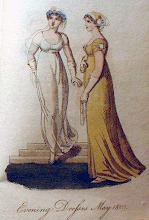True gentlemen of the period were expected to dance when the host or hostess (at a private ball), or the master of ceremonies (at a public ball) suggested a young lady whom they desired to see dancing. When a young man refused to dance, it was taken as an assult upon a young woman's character and an unforgivable slight on her part toward the young gentleman.
Social Faux Pas
In polite society of the Regency Period, only the eldest daughter and perhaps the second eldest (if they were close in age) would be expected to be present at public gatherings. When a young woman reached a marriageable age (determined by her father or guardian), she had a "coming out" party, at which she would be presented in women's fashions of the day, and would be allowed to enter the social arena of public and private parties and balls. The eldest daughter was always presented first, and after she was married, the next daughter could be introduced to society.
For the Bennets to have all their daughters "out" into society at the same time, with none of their other daughters married, would have been a great social faux pas.
Impropriety
In this short excerpt of the A & E's 1995 adaption of the novel, the Bennet family provides many examples of social impropriety. The first observation of impropriety can be seen in the behaviour and forthright nature of Sir William Lucas toward Mr. Darcy. Sir Lucas displays his lack of decorum, as he interrupts the dance between Elizabeth and Mr. Darcy, rudely acting as though he was the host of the event instead of an invited guest of Mr. Bingley, as well as assuming upon the engagement of Mr. Bingley and Jane--without regard for the lack of announcement toward any relationship of that nature.
Later that evening, one can also acknowledge the impropriety of Mary, who takes up the piano without invitation. One expert on period etiquette notes "it must always be remembered and it cannot be too often repeated, 'that whatever it is worth while to do, it is worth while to do well
(The Mirror of Graces by a Lady of Distinction, 1811).'" As well as "...order is the beautiful harmonizer of the universe, so consistency is the graceful combiner of all that is in woman to perfection. Consistency is the soul of female power, the charm of her fascination, the bond of her social happiness (The Mirror of Graces by a Lady of Distinction, 1811)," which so well points out the rude behavior exhibited by Lydia and Kitty.
